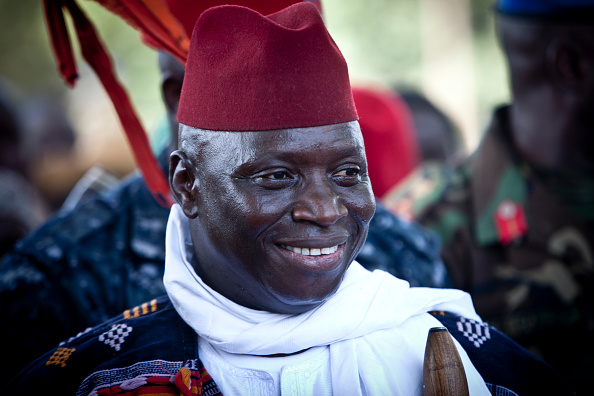Banjul – In a victim’s centre in The Gambia’s capital Banjul, Mariama Marong Baldeh lifts up an old photo of herself and her deceased husband, a Gambian soldier, recalling a happy memory.
The photo was taken before the 1994 execution of her husband Basiru Barrow: he had been accused of taking part in a mutiny against a military junta led by Yahya Jammeh.
But years on, his wife Mariama is still waiting for justice.
A presidential election is taking place in the small West African nation on Saturday – over which the legacy of Jammeh still casts a shadow.
The ex-dictator seized power in 1994, and for 22 years, he oversaw a regime accused of committing abuses such as state-sanctioned murder, torture and rape.
ALSO READ | Gambians go to polls in first vote since Yahya Jammeh era
Jammeh was forced into exile in Equatorial Guinea in 2017, after losing an election to a relative unknown, Adama Barrow.
But he retains considerable support in The Gambia, and his possible return from exile and how the country should respond to his alleged crimes have been central themes in the run-up to Saturday’s poll.
There are fears that moves to placate the pro-Jammeh bloc in Gambian politics will hamper a years-long push to put the former leader, and his associates, on trial.
“Justice has to be done,” Mariama told AFP.
She is not certain it will be, however.
Death squads
Under President Barrow, The Gambia’s government set up the Truth, Reconciliation and Reparations Commission to probe allegations of Jammeh-era abuses.
Between 2019 and May, the panel heard hundreds of witnesses, who offered testimony about death squads, rape and witch hunts under Jammeh.
Mariama testified to the commission in 2019, alongside her husband’s first wife.
Last month, the commission handed the government its long-awaited findings and urged it to pursue criminal charges.
Neither the report, nor the names of the officials the TRRC deemed responsible, were made public.
ALSO READ | Gambia truth panel urges prosecutions for Jammeh-era crimes
But although it appears to be a win for rights groups, few are confident that the government will follow through on the report’s recommendations, chiefly because of a perceived rapprochement between Barrow and Jammeh supporters.
In September, ignoring public outrage, Barrow’s NPP party formed an alliance with Jammeh’s APRC party, in what was viewed as an electoral ploy.
But Jammeh subsequently said the pact was formed without his knowledge, and his supporters formed a rival party.
Barrow has six months to respond the TRRC report and has promised justice, although he has urged victims to be patient.
Opposition leader Ousainou Darboe, the president’s main electoral rival, simply laughed when asked by AFP whether Barrow would implement the recommendations.
‘Needs to be justice’
Mariama said there was a “question mark” hanging over the justice process because it is being overseen by the president.
But some people deeply involved in seeking justice for Jammeh victims remain hopeful, despite their scepticism of the government.
Reed Brody, an American lawyer who works with Jammeh-era victims, said that an ideal scenario would involve the Gambian government launching criminal proceedings.
ALSO READ | Gambia president receives report on ex-dictator Yahya Jammeh crimes
But taking Jammeh cases to international criminal courts remains a possibility, he said, noting many officials outside of The Gambia are unwilling to let the ex-dictator off the hook.
“One way or another, whether it is a court in The Gambia, a regional court, an international court, there needs to be justice,” he said.
For TRRC spokesman Essa Jallow, the success of the truth commission process has been in establishing facts about the 22 years of dictatorial rule in The Gambia.
“One of the objectives of the TRRC is to provide an impartial record, and that record will remain in our history,” he said.
“What we cannot change is the history”.
Follow African Insider on Facebook, Twitter and Instagram
Source: AFP
Picture: Getty Images
For more African news, visit Africaninsider.com


